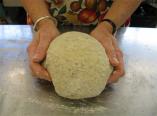 Obesity and its brethren (diabetes, cancer, GERD etc.) are the latest uninvited guests at the 21st century table. And what they’re eating is sugar.
Obesity and its brethren (diabetes, cancer, GERD etc.) are the latest uninvited guests at the 21st century table. And what they’re eating is sugar.
Or is that all they’re eating? I do think we overdo it with sugar of all kinds, and that we owe it to ourselves to avoid any foods (if we can!) that contain added sugar as well as a host of polysyllables, as part of my campaign against the trend of involuntary consumption. And where stealth campaigns have been led by vested interests – check out this eye-opening article about the sugar industry’s attempt to build its market regardless of cost to human health – my hackles get raised and my consumer dollar goes elsewhere.
But I also think that we humans are obsessed with single solutions, while nature is insanely complex in every possible way: as a species we’re a long way from understanding the difference between ruling the world and knowing our place in the ecosystem. Where food is concerned, we’re no less determined. Michael Pollan wrote about it as nutritionism; David Katz reviles it as the ONNAT fallacy.
So while I absolutely agree we should drastically reduce our consumption of it, I don’t think sugar is the only villain. But it’s been very topical in recent years.
Michael Pollan, in The Omnivore’s Dilemma, explained to a shocked readership back in 2006 the many faces of the number one subsidized crop in the US — in the words of the bookstore clerk who handed my copies across the counter: corn, eh: who knew? Pollan was appalled at what he’d discovered about corn’s new evil incarnation as high fructose corn syrup (HFCS), which is in just about everything these days. Though he recently admitted to being appalled at how his exposé had been turned into marketing leverage by the sugar industry, his book certainly spread the word to a wider public. On food labels, it can be hard to spot HFCS – or many other sugars – as the manufacturers keep adding new names to confuse us, but there are guides out there to help us dodge the bullet.
 Last year’s GMO film, Genetic Roulette, presented the theory that genetically modified corn, impregnated with Bt toxin designed to explode the stomachs of caterpillars, could be implicated in this century’s astonishing increase in food allergies. We have been assured that Bt will not affect humans, but it has been found in the human bloodstream (along with glyphosate/Roundup). What is it doing there? Is GM corn contributing to leaky gut in humans? One theory holds that food allergies can be caused by food particles entering the bloodstream through a weakened intestinal wall (“leaky gut”) and the body sees the food substance as a threat and creates antibodies against it, creating a food allergy or intolerance. A good subject for further study. Meanwhile, I think we should all avoid GM products until they’re proven safe: and that includes anything containing HFCS, since it’s likely made from GM corn. Our own table sugar in Western Canada is made from genetically modified sugar beets, so avoid that too.
Last year’s GMO film, Genetic Roulette, presented the theory that genetically modified corn, impregnated with Bt toxin designed to explode the stomachs of caterpillars, could be implicated in this century’s astonishing increase in food allergies. We have been assured that Bt will not affect humans, but it has been found in the human bloodstream (along with glyphosate/Roundup). What is it doing there? Is GM corn contributing to leaky gut in humans? One theory holds that food allergies can be caused by food particles entering the bloodstream through a weakened intestinal wall (“leaky gut”) and the body sees the food substance as a threat and creates antibodies against it, creating a food allergy or intolerance. A good subject for further study. Meanwhile, I think we should all avoid GM products until they’re proven safe: and that includes anything containing HFCS, since it’s likely made from GM corn. Our own table sugar in Western Canada is made from genetically modified sugar beets, so avoid that too.
Then we had evidence that HFCS caused more weight gain than other sweeteners. But then Marion Nestle trashed the study design. Another weird study emerged: the “Australian paradox” claimed that Australian sugar consumption had gone down, while obesity levels had gone up. Then that study was trashed.
 Then in 2009 we got Robert Lustig’s seminal lecture, The Bitter Truth About Sugar, where we learned in no uncertain terms that sugar of any kind is toxic, addictive and best friend to cancer, arthritis and all manner of inflammation. You can (and should, if you haven’t joined the 3 million viewers to date) watch it for yourself. But discovery is followed by rebuttal, and in 2011 David Katz took issue with the scapegoating of sugar and only sugar and urged the holistic approach to food. He took issue with Lustig’s definition of fructose as an addictive substance, and pointed to its origins in fruit which is not addictive. But the problem is that the fructose we’re being fed is not in fruit any more: it’s been isolated by the food industry and robbed of its accompanying fibre, enzymes and nutrients.
Then in 2009 we got Robert Lustig’s seminal lecture, The Bitter Truth About Sugar, where we learned in no uncertain terms that sugar of any kind is toxic, addictive and best friend to cancer, arthritis and all manner of inflammation. You can (and should, if you haven’t joined the 3 million viewers to date) watch it for yourself. But discovery is followed by rebuttal, and in 2011 David Katz took issue with the scapegoating of sugar and only sugar and urged the holistic approach to food. He took issue with Lustig’s definition of fructose as an addictive substance, and pointed to its origins in fruit which is not addictive. But the problem is that the fructose we’re being fed is not in fruit any more: it’s been isolated by the food industry and robbed of its accompanying fibre, enzymes and nutrients.
And, the way simplifications go, simply not eating sugar won’t necessarily protect you from cancer. Last year a study found that cancer will turn to other sources of nourishment if it can’t get sugar (glucose): cancer cells feed quite happily on glutamine, which is not a sugar but an amino acid, and the most common one in our bodies.
And now we start the new year with another study that says there is something different about fructose: an imaging study of human brains reveals its effect on appetite. It doesn’t make you feel full (as glucose does). And if you don’t feel full, you don’t know when to stop eating, and round and rounder you go.
Perhaps, then, it’s not so much an addiction as a treadmill. Stay tuned. The story is far from over…








